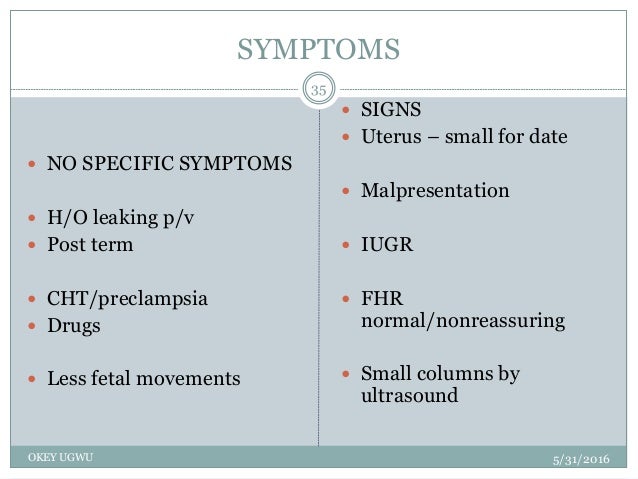

Women mistake it with vaginal discharge which looks like clear or milky white mucus. It is thin and watery: It is not thick and sticky.

At times when it breaks in a gush a popping sound is heard. Some medication, such as ibuprofen, can also decrease the production of amniotic fluid, so it is important to inform the obstetrician before any medication is started.You can detect pressure: When the water breaks pressure is felt followed by leakage.

If there are no signs of infection or bleeding associated with fluid leakage, the woman can be monitored periodically as an outpatient. Mild low levels of amniotic fluid will be monitored, and the doctor will likely advise bed rest and increased water intake. This will help to prevent further fluid loss and the emergence of other complications. Ultrasound can be used to measure the amniotic fluid within the gestational sac. Immediate medical help is vital, but treatment is usually done with weekly consultations with the obstetrician to assess the amount of fluid lost throughout pregnancy. Treatment for leaking amniotic fluid varies according to gestational age: 1st and 2nd trimester What to do if you are leaking amniotic fluid Vaginal discharge is also odorless but normally has more of an egg white consistency. Urine is normally yellowish and has a distinct odor, while amniotic fluid is transparent and odorless. What does amniotic fluid smell like and look like?Ī good way to tell if the wetness in your underwear is amniotic fluid, urine or vaginal discharge is to use a panty liner and observe the characteristics of the fluid. Pregnant women with risk factors such as high blood pressure, diabetes, or lupus are more likely to have amniotic fluid leakage, but it can happen to any pregnant woman. Decreased movements of the baby in the womb, when there has already been a great loss of fluid.Wet underwear with an odorless and colorless liquid.Some signs that may indicate that amniotic fluid is leaking include: Increased vaginal discharge can also look like leaking amniotic fluid. In most cases, leaking amniotic fluid can be easily mistaken for urine incontinence, which is common during pregnancy and happens due to the weight of the uterus on the bladder.


 0 kommentar(er)
0 kommentar(er)
